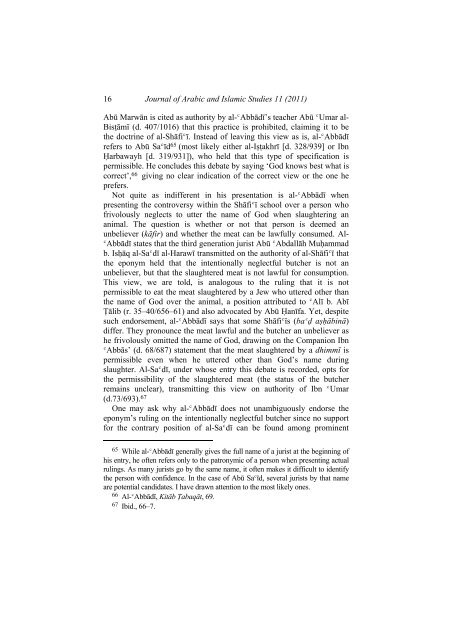JOURNAL OF ARABIC AND ISLAMIC STUDIES
JOURNAL OF ARABIC AND ISLAMIC STUDIES
JOURNAL OF ARABIC AND ISLAMIC STUDIES
Create successful ePaper yourself
Turn your PDF publications into a flip-book with our unique Google optimized e-Paper software.
16<br />
Journal of Arabic and Islamic Studies 11 (2011)<br />
Abū Marwān is cited as authority by al-ʿAbbādī’s teacher Abū ʿUmar al-<br />
Bisṭāmī (d. 407/1016) that this practice is prohibited, claiming it to be<br />
the doctrine of al-Shāfiʿī. Instead of leaving this view as is, al-ʿAbbādī<br />
refers to Abū Saʿīd 65 (most likely either al-Iṣṭakhrī [d. 328/939] or Ibn<br />
Ḥarbawayh [d. 319/931]), who held that this type of specification is<br />
permissible. He concludes this debate by saying ‘God knows best what is<br />
correct’, 66 giving no clear indication of the correct view or the one he<br />
prefers.<br />
Not quite as indifferent in his presentation is al-ʿAbbādī when<br />
presenting the controversy within the Shāfiʿī school over a person who<br />
frivolously neglects to utter the name of God when slaughtering an<br />
animal. The question is whether or not that person is deemed an<br />
unbeliever (kāfir) and whether the meat can be lawfully consumed. Al-<br />
ʿAbbādī states that the third generation jurist Abū ʿAbdallāh Muḥammad<br />
b. Isḥāq al-Saʿdī al-Harawī transmitted on the authority of al-Shāfiʿī that<br />
the eponym held that the intentionally neglectful butcher is not an<br />
unbeliever, but that the slaughtered meat is not lawful for consumption.<br />
This view, we are told, is analogous to the ruling that it is not<br />
permissible to eat the meat slaughtered by a Jew who uttered other than<br />
the name of God over the animal, a position attributed to ʿAlī b. Abī<br />
Ṭālib (r. 35–40/656–61) and also advocated by Abū Ḥanīfa. Yet, despite<br />
such endorsement, al-ʿAbbādī says that some Shāfiʿīs (baʿḍ aṣḥābinā)<br />
differ. They pronounce the meat lawful and the butcher an unbeliever as<br />
he frivolously omitted the name of God, drawing on the Companion Ibn<br />
ʿAbbās’ (d. 68/687) statement that the meat slaughtered by a dhimmī is<br />
permissible even when he uttered other than God’s name during<br />
slaughter. Al-Saʿdī, under whose entry this debate is recorded, opts for<br />
the permissibility of the slaughtered meat (the status of the butcher<br />
remains unclear), transmitting this view on authority of Ibn ʿUmar<br />
(d.73/693). 67<br />
One may ask why al-ʿAbbādī does not unambiguously endorse the<br />
eponym’s ruling on the intentionally neglectful butcher since no support<br />
for the contrary position of al-Saʿdī can be found among prominent<br />
65 While al-ʿAbbādī generally gives the full name of a jurist at the beginning of<br />
his entry, he often refers only to the patronymic of a person when presenting actual<br />
rulings. As many jurists go by the same name, it often makes it difficult to identify<br />
the person with confidence. In the case of Abū Saʿīd, several jurists by that name<br />
are potential candidates. I have drawn attention to the most likely ones.<br />
66 Al-ʿAbbādī, Kitāb Ṭabaqāt, 69.<br />
67 Ibid., 66–7.

















